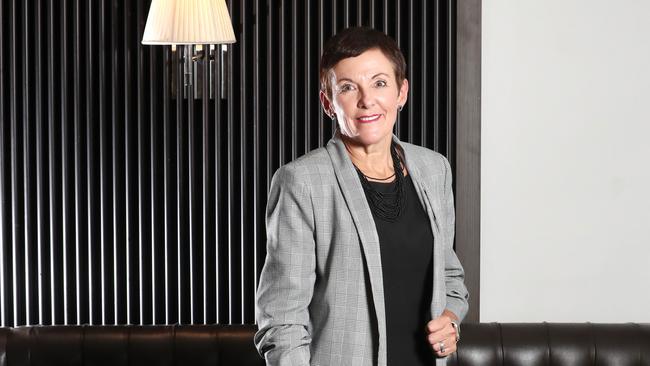Hayne report: Ombudsman Kate Carnell calls for firmer credit footing for SMEs
Small business ombudsman Kate Carnell has warned of a “credit squeeze” in the $300 billion SME sector.

Small business ombudsman Kate Carnell has called on the Hayne royal commission, policymakers and regulators to work harder to get small and medium business on a firmer footing against the banks or risk a “credit squeeze” in the $300 billion sector.
Her comments come as new research from fintech lender and aspiring bank Judo Capital shows startling results about small businesses’ access to credit and frustration with the banks.
Ms Carnell said despite the royal commission, the banks were still shying away from making real commitments to small business customers, including in their revised code of conduct, which gave them lots of “get-out clauses”.
“If we don’t fix this, it is actually heading toward a credit squeeze for small business,” she told The Australian.
“Hayne didn’t have time to delve into quite complex (SME) cases …
“What he did say is that a major protection should be the banking sector’s code of conduct.
“Although it (the revised industry code of conduct) is better than the last one, we believe the code in its current form is undermining some of the work.”
A new banking code of practice, which is overseen by the Australian Banking Association and comes into force in July, has been approved by the corporate regulator. That follows a review of a 2013 document.
The ABA has said benefits include simplified business contracts and new cooling-off periods for guarantors.
While the document says that if a small business is in default on a loan it will have 30 days’ notice to repay the loan in full or face enforcement proceedings, the banks have given themselves four options to provide a “shorter notice period”.
Ms Carnell said banks were also more risk-averse on loans and providing “a lot of rhetoric” rather than action.
“What I’d like to see is some confidence being put back into the system in terms of how to lend to small businesses appropriately and fairly.”
Royal commissioner Kenneth Hayne will deliver his final recommendations to the federal government by tomorrow, with the report being made public on Monday. In his interim report, he warned against further regulation for small business banking but hinted that better disclosures and protections could work.
“The evidence and submissions provided to the commission did not reveal any great appetite to change the legal framework,” Mr Hayne said, but noted more information to those acting as guarantors for small business was probably required.
The royal commission heard several disturbing small business cases, including one in which Westpac didn’t explain to a pensioner with multiple debilitating health conditions the risk of losing her house by guaranteeing her daughter’s business loan.
The federal government seized on the business lending issue in November when it announced measures to bolster access to capital for the sector. They included a $2 billion Australian Business Securitisation Fund and a separate business growth fund.
Analysis by the Australian Prudential Regulation Authority this week highlighted moderate business credit growth through 2018, which picked up in the latter months to deliver a 4.5 per cent increase in the year to November.
National Australia Bank’s head of business banking Anthony Healy admitted banks had “more to do” in improving their standing with small business and had recently conducted 13 “listening forums” in rural and regional communities.
“We are open to policy ideas that support the sector and accelerate the creation of new business and opportunities,” he told The Australian. “We fully supported the interim findings of Commissioner Hayne in relation to SMEs and will continue to engage with government and other regulators to ensure that capital is available to support this important sector.
“We know we will earn trust through listening and taking action for our customers and by making banking easier and simpler and more transparent.”
But a new report by Judo, to be released today, shows a funding gap of $83 billion confronts small and medium business as they grapple to access finance.
Judo commissioned a survey by East & Partners of more than 1750 business owners with current debt facilities in place which found 50 per cent of small enterprises could not access credit easily. That figure was 30 per cent among medium-sized businesses.
“These findings confirm what we understood to be true — SMEs looking to borrow money have lost faith in the incumbent banks to provide the funding they desperately need and deserve,” Judo’s chief risk officer Jacqui Colwell said.
“Small businesses represent 97.5 per cent of all businesses operating in Australia and employ 44 per cent of people in the private, non-financial sector, so it is critical that we address issues arising from the banks dealings with SMEs.
“SMEs are now looking to the Commission’s final report and recommendations to address the reasons for their loss of trust in the incumbent banks.”
Judo’s survey also showed that nine out of 10 business owners said they would prefer to consult colleagues or friends for lending advice over a bank.
A Bendigo and Adelaide Bank spokesman said the lender supported “any initiatives” that helped Australian small businesses.
“Continuing to build our small business portfolio is a key part of our vision to be Australia’s bank of choice,” he said.
“We will welcome any recommendations that put the interests of all customers first.”




To join the conversation, please log in. Don't have an account? Register
Join the conversation, you are commenting as Logout